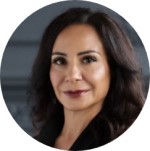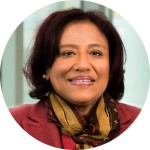

Gender equity is vital to the wellbeing of all communities. Achieving gender parity in global healthcare governance at every level is essential to innovative solutions, digital transformation and improving access to care. According to new data from the Bill & Melinda Gates foundation the world will not reach gender equality until 2108, three generations later than previously projected. This is distressing considering that women play a critical role in strengthening the health ecosystem.
Currently, women make up 70% of the global healthcare workforce. In addition, 90% of women bear the paid and unpaid caregiving roles in the world, enduring dynamic responsibly in care delivery by making 80% of care decisions. Numerous research indicates that this balancing act puts women at risk for poor mental and physical health outcomes. The dominance of inequitable policies, social and organizational norms all combine to form innate hurdles that further pressurize these outcomes.
As we approach International Day of the Girl, it allows us to highlight opportunities to promote and invest in girls to enter and remain in the healthcare ecosystem. With women making up only 22% of Artificial Intelligence professionals and the gender gap in mobile internet use now at 16%, policymakers and government officials must take action now to dismantle inequalities. We must increase access to education and economic assets so that we can support the next generation. As women and children continue to play multiple roles individually and at the societal level, their health and well-being needs must be spotlighted. It is imperative that heath technology proactively innovates and researches solutions specific to their needs. To improve outcomes diverse voices must be engaged in decision-making spaces where all can feel a sense of belonging and respect.
To close the gap, mechanisms and systems must be established that are accountable to gender equity. Practices and processes must be measured to safeguard the value, resource, and equitable advantage for girls. Remove the barriers, break the stigma and meet the issues with empathetic dialogue and action. It will take a collective energy to truthfully impact global transformation.
Now let’s hear from the HIMSS Global #WomeninHIT Community as they reflect on #healthequity and #DayoftheGirl.
Tania Tajirian, MD, Chief Medical Information Officer at Centre for Addiction and Mental Health (CAMH) - a validated HIMSS EMRAM Stage 7 organization, 2022 Most Influential Women in Health IT Award Winner and Women in Health IT Community Member

- What do you think of when you hear the word “girl”?
Personally, I associate the word girl with the word daughter. I contemplate how privileged my own daughter is because of where she was born. Girls in our society are not permitted to leave school prior to the age of sixteen — in stark contrast with other societies in which girls are not permitted to attend school at all. My heart breaks for girls growing up in societies that suppress their access to much of what I hold dear, including access to education, nutrition, legal representation, social supports, and healthcare. Sadly, examples of girls being forced as children into marriage, suffering violence, limited education, and only having access to subservient roles in society are still ubiquitous. This shows that wherever women in leadership roles can influence a lot of girls for the better, they must! It's imperative that we not only guard against the erosion of rights for women and girls, but also advocate, train, and provide opportunities for girls to flourish into leadership positions, so that they too can be in a position to mentor the next generation of girls (and boys, for solutions include everybody).
While it typically feels like the most we can hope to achieve is to influence the quality of girls' lives in our corner of the world, the nature of IT is such that we never quite know how or where that influence may spread.
What I love about The Day of Girls is that it helps raise awareness of not only the issues that girls face, but also their celebration of its impactful solutions, such as how increasing girls' education can reduce child marriage rates, and how they can strengthen our economies by increasing jobs for women. Given how fragile our economies are, how can we afford to have half our brainpower not participate?
- If you had access to a time machine, what advice would you give to your younger self?
Never forget that small doors open up to big places. I've been privileged to have had wonderful mentors, and the good fortune of being tapped into leadership positions. I’ve also learnt over the years to say yes more often and trust what others see in me. But most importantly, young Tania, learn to tame the imposter syndrome which sadly impacts females more.
Learn to trust yourself and the expertise you bring to the table and the journey (it’s a marathon!) and remember, important growth happens when you're performing outside your comfort zone. But make sure you are still passionate about your work, otherwise it’s time for a change. The only constant in life is change, so buckle up for the twisty rides, and surround yourself with a tribe you respect.
- What do you observe as the greatest barrier to women?
What I see as the greatest barrier for women in healthcare leadership today is the ongoing gender biases and stereotyping against women's professional leadership aspirations. Women also have less access to leadership networks and have the higher share of family responsibilities. It is critical to strategically promote equity, invest in women leadership programs and mentorship networks, such as HIMSS Women in Health IT. Career advancement goals should be communicated clearly and become embedded in the organizational culture.
- Why must we invest in young girls to be leaders and impact change in healthcare and information technology?
In my opinion, we need to expose and embed technology-related education early on for all girls. Most women have little exposure to the realm of health IT world training. They will typically shy away from health IT roles as it is assumed to be a highly technical field, and that is why we need female IT role models to demystify and bust these assumptions.
It is important to emphasize that we need both sides, yes, the technical but also our expertise in change management and emotional intelligence. Health technology is serving its populations and we must co-design these tools with equity, diversity and inclusion always on our minds.
Finally, it also means that we remain unapologetic for what girls want and what they deserve and how collectively we will continue to fight for our rights and teach our children to do the same.
Jaya Tripathi, MS, Principal Scientist at The MITRE Corporation - a HIMSS Diamond Corporate Member, 2022 Most Influential Women in Health IT Award Winner and Women in Health IT Community Member

- What do you think of when you hear the word “girl”?
The connotation of the word “girl” changes depending on the context. When a woman is referred to as a “girl”, I find it derogatory. When used for referring to a child or adolescent female, the thought that conjures up in my mind might differ according to cultural, ethnic and geographic contexts. (It is interesting to note that the word ‘girl’ was a gender neutral term until the Middle Ages).
However, there is one thought that transcends these differences – and that is HOPE – the freedom and courage to chasing her dreams!
- If you had access to a time machine, what advice would you give to your younger self?
I would believe in myself more, believe that I was capable of achieving anything I set my heart to. I often felt held back from expressing my opinion aloud at office meetings.
I realize now that some of it was cultural conditioning that held me back and some of it was my own doing, setting impossibly high standards for myself, before deeming my thoughts and ideas worthy of expression.
The other advice I would give myself is to be less idealistic about the world and mix in a healthy dose of practicality.
- What do you observe as the greatest barrier to women?
Gender conditioning and biases (sometimes unconscious) are ingrained into the psyche of women from a young age, often by older women in the family. Young women typically do not grow up around successful professional role models and are more likely to be subject to rules on acceptable social mores - the age-old nature, not nurture argument against girl children succeeding in science, leads to a self-fulfilling prophecy.
In many cultures, women lack support in raising children and running a household precisely at the time in their life when career advances are more rapid (than in the latter half of their careers). The lack of support is felt more in urban, nuclear family settings. When compounded with inequitable pay, women are left having to choose between career and family. This loss of financial independence has repercussions on mental health and feelings of disempowerment.
Thankfully, these barriers have been coming down and we have opportunities today that our grandmothers could only hope for.
- Why must we invest in young girls to be leaders and impact change in healthcare and information technology?
While women comprise 70% of the healthcare workforce, they are under-represented in leadership roles. This is especially true of women of color.
While I believe we must invest in children regardless of gender, tap their potential by providing them opportunities at a young age, particular attention should be given to create the right environment for young girls because they have been left behind for centuries.
Women represent half of our population and an educated woman has a positive effect on her own health, her family and the community.
I will end with a quote from the former UN Secretary-General Kofi Annan: “No other policy [than educating girls] is as likely to raise economic productivity, lower infant and maternal mortality, improve nutrition, promote health, including the prevention of HIV/AIDS, and increase the chances of education for the next generation. Let us invest in women and girls.”
Bonnie Clipper DNP, MA, MBA, RN, CENP, FACHE, FAAN, Managing Director at Innovation Advantage, HIMSS Analytics North America Advisory Board and Innovation Council Member

- What do you think of when you hear the word “girl”?
I think the term “girl” identifies a smart, motivated, young leader that would benefit by focusing and building a network early in life. We lack gender equity and even today it is still more of a challenge for women (girls) to get into the same roles at the same pay with the same expectations as our male colleagues. However, we have an opportunity to change that by mentoring “girls” and providing them with the guidance and resources that many of us didn't receive until we were mid-career. “Girls” have an amazing opportunity to do anything that they dream of, and with a little help from a strong support system, engaged teachers and mentors there is nothing that they cannot do.
- If you had access to a time machine, what advice would you give to your younger self?
Don't accept norms. Push your way into the rooms where “the real” conversations are occurring. Find the respectful ways to share your insights and ideas and continue to make way for other women as well. For me, since I am a nurse and my career has been spent as a healthcare leader, I have been part of a profession that is 90% female. I think that the opportunity to lift other women up is incredibly important. I am a competitive person by nature and in hindsight, I wish that I acted more as a “coopetitor” where I provided as much cooperation as I did competition. I have learned somewhat late in my career how important it is to support other women and help younger women understand why this is important in order for all of us to be successful.
- What do you observe as the greatest barrier to women?
Gender norms and I hate to say it, but often other women can be barriers to women succeeding. If all women collaborated and banded together we would be unstoppable. However, we don't always do this. Sometimes we even bully and sabotage each other with petty things. If we stuck together and elevated other women and women-led companies it helps all women be successful. Keep pushing through the norms, we have so much to contribute.
- Why must we invest in young girls to be leaders and impact change in healthcare and information technology?
Young girls are the opportunity for us to apply the lessons that many of us have learned as adults and we can help them learn it in days versus years. This speeds up the learning cycle and can improve the success cycle, it increases the impact we can make.
Lygeia Ricciardi, EdM, Founder & CEO at AdaRose, Inc., a HIMSS National Capital Chapter Member, 2019 Most Influential Women in Health IT Award Winner, and Women in Health IT Community Member

- What do you think of when you hear the word “girl”?
It’s a positive word. It makes me think of a carefree kid, running around outside with friends, with pigtails in her hair and a big smile on her face. Or maybe spending quiet hours exploring or reading.
Ideally, girlhood is a time to play, to learn, and to dream. Most girls don’t yet have the responsibilities of adulthood. They’re also free from the self-consciousness many develop later in life, and they haven’t yet experienced the challenges particular to being a woman.
Of course, girlhood is not always idyllic, and can be filled with struggle and pain. But it also contains moments of wonder and joy. When I hear “girl,” I think possibility.
- If you had access to a time machine, what advice would you give to your younger self?
Hey there, Younger Me! I’m here to tell you to enjoy the phase of life you’re in right now, and don’t worry so much about the future. It will all work out, even though it will get tough—really tough—along the way sometimes. You’re stronger than you realize.
The world will throw plenty of obstacles your way, so don’t pile on by being a self-critic, too. Everybody makes mistakes and fails sometimes. That’s normal, and even essential for your development.
So listen up. You have all the tools you need, and so many opportunities. Look deep inside yourself to figure out what you want to do with your career and your life, and then boldly go after it. The biggest risk you can possibly take is not taking enough risks.
Along the way, always reach out to and support other girls, other women. You need them, and they need you. And besides, they make the journey so much more fun.
- What do you observe as the greatest barrier to women?
Traditional mindsets held by men and women alike that constrain women’s roles and consider women to be less valuable, capable, or worthy than men.
- Why must we invest in young girls to be leaders and impact change in healthcare and information technology?
Girls receive many messages, implicit and explicit, that tell them they are not leaders, to stay quiet and make themselves small. To overcome them, they need to also hear encouragement to move beyond outmoded ways of thinking that no longer serve them. We need the full skills, passion, creativity and empathy of women to improve Health IT and the broader society.
Atefeh (Atti) Riazi, Senior Vice President & Chief Information Officer at Memorial Sloan Kettering Cancer Center - a HIMSS Organizational Affiliate, 2022 Most Influential Women in Health IT Award Winner and Women in Health IT Community Member

- What do you think of when you hear the word “girl”?
I think of a child or a teen. I call my daughters my girls. From that perspective, it is a term of endearment. It shows love, innocence, joy, youth and optimism. I also think of power, empathy, love and compassion.
Now, when I also hear the word “girl” I think of gender gaps, child marriage, girls being trafficked, girls’ lack of access to healthcare or to reproductive care, to education, employment, gender sexual abuse and so on.
- If you had access to a time machine, what advice would you give to your younger self?
Be bold and break and bend more rules. Swear that you will do everything you told yourself you will never do because you are a girl. Eat less, have a lot less cake and read a lot more books. Question all dogmatic and cultural views about girls and what is “good” or “bad”.
I would tell myself to spend more time with my grandmother on her old worn carpet sipping tea and understanding her upbringing. I would get to know my mother more and better understand the social barriers that she and my grandmother faced and overcame
- What do you observe as the greatest barrier to women?
Women face many barriers, starting with a lack of access to land, money or jobs. They don’t have access to technology and the digital divide excludes women at a much a higher rate. Gender-based violence and discrimination in many cultures is a serious concern for women. These issues make it difficult for women to get on equal footing with men. Legal barriers and cultural views further worsen gender inequalities in many societies.
- Why must we invest in young girls to be leaders and impact change in healthcare and information technology?
Investment in women’s education and health, especially getting more women in the tech sector, is critical. Our industry is lopsided with so many women as consumers but not many contributing to the creation of tech. Leadership in all areas but especially tech and healthcare will ensure better employment opportunities and will pay big dividends in terms of economic development. It will also ensure that more focus is on the health of women and their children.
Statistic shows that each additional year of schooling increases women’s earnings by about 11.7 points. Women can be powerful instruments of social change. When women are healthy, educated, and empowered, they take leadership roles in their community. Educating women helps bring about democracy.
It is a given that high-gender-diversity firms deliver much better returns on average than less diverse organizations. Diversity in leadership teams allows for growth, innovation and improved financial performance across organizations and markets.
Joy Rios, MBA, CEO/Cofounder/Host at HIT Like a Girl Pod, Women in Health IT Community Member

What do you think of when you hear the word “girl”?
I think “girls” are set up in society to be sheltered and protected. Even if this approach has good intentions, it ultimately works to systematically disempower the same people it’s trying to protect.
In place of being taught that girls are pretty, frail, and shouldn’t take up too much space or cause trouble, I think they should be taught that they are smart, capable and natural leaders.
- If you had access to a time machine, what advice would you give to your younger self?
Understand that for reasons completely out of your control, you will not be chosen to lead. But that’s the thing about leadership: sometimes it chooses you. Keep collecting unique experiences that broaden your perspective; take paths that make sense to you even, especially, if they don’t make sense to anyone else, and generously share the lessons you learn along the way.
Being underestimated can be transformed into a superpower.
- What do you observe as the greatest barrier to women?
In both private and public spheres women face biases that have been built into systems of power. Whether considering body autonomy, access to leadership roles, economic barriers, or even understanding our anatomy, women consistently face a lack of agency and being devalued.
- Why must we invest in young girls to be leaders and impact change in healthcare and information technology?
Gender equitable societies are healthier for everyone, on all levels.
Healthcare and information technology are relevant to everyone in our society, so ensuring that these systems take diversity, equity, and inclusion into account at all levels will help us better manage the health of our entire population.
Gabriela Mustata Wilson, PhD, MSc, FHIMSS, FIAHSI, SNAI, Professor, CO-Director of the Multi-interprofessional Center for Health Informatics, Director of Health and Public Health Informatics at the University of Texas at Arlington - a HIMSS Organizational Affiliate & Approved Education Partner, Member of TIGER International Task Force, Women in Health IT, Global Health Equity Network, Nursing Informatics, Healthcare Cybersecurity, and Interoperability & HIE HIMSS Communities.

- What do you think of when you hear the word “girl”?
When I hear the word “girl” I think of all the bold, passionate, intelligent young women shaping a brighter future because they are not afraid to chase their dreams and constantly advocate for themselves and others. I think about Malala Yousafzai, one of the best-known advocates for female education in the world; Greta Thunberg, the Swedish-born climate change activist; Emma Gonzalez advocating for gun control; or Jazz Jennings, a transgender advocate who spreads the message of inclusion and equality on air and social media platforms. There are many examples of remarkable young women who inspire me every day through their actions to provide us and future generations with a better future.
Unfortunately, when I hear the word “girl,” I also think of the inappropriate way in which others are using this word. For example, when I hear someone referring to a young female professional as a “girl” or “young lady,” I see it as an insult because it puts that person in an inferior position and makes her look weak, inexperienced and childlike. We have a lot of work to do collectively to remediate that, and we need to start early on with how we educate our children. Think about how many times you heard parents tell their sons not to be like a “girl” or not to cry because only “girls” cry. I bet you have never heard someone say the opposite, which clearly indicates that we have a lot of work ahead of us if we want to eliminate gender inequality in our society.
- If you had access to a time machine, what advice would you give to your younger self?
Growing up I always wanted to be a boy, not a girl. I guess this was fueled by the fact that girls always needed to behave in a certain way: always obedient, soft, not outspoken, etc. Growing up in Romania during the Communist regime, I never felt that I was good enough. I knew I was smart, as I always finished at the top of my class. Nevertheless, as I started college, I realized that being smart and at the top of the class was not enough to do well. The right connections and money were more important than anything else.
Consequently, I began to doubt my abilities and feared that I might not have what it takes to succeed. Immediately after the Romanian Revolution, freshly wed to my high school sweetheart and wanting things to change more quickly, we began to explore; at first only mentally. We had the idea of seeking what the world had to offer. Through challenges and very scarce resources, as we left our native country with one suitcase and very little money, it was hard to imagine what the future would look like at that time. However, we knew that if we worked hard, continued our studies, and followed the morals and ethics instilled in us by our parents, we could probably make it.
Through all the challenges I encountered as an immigrant in two different countries, I started to believe more in myself, find my strengths, and change from a shy girl to the confident, happy, and strong woman I am today. My advice to my younger self would be: never wish you were a boy! Embrace who you are, believe in yourself, and stand up and speak up because you can change the world, so no other girl ever wishes to be someone different.
- What do you observe as the greatest barrier to women?
The greatest barrier for a woman is gender stereotyping and unconscious bias, which can translate to not being taken seriously, regardless of one’s credentials and expertise. I see this happening every time an extremely well qualified female candidate applies for a high-level position in any industry. The sad thing is that the scrutiny often comes from other women, which makes me very sad. What can we do collectively to change this attitude? I am hopeful that through communities like HIMSS Women in Health IT, we can better prepare women to support other women. Only then can we become the role models and inclusive leaders we wish we had.
The second greatest barrier remains gender equality, which deepened due to the pandemic. If you look at the numbers, female job losses due to COVID-19 are much higher than men’s. Why is that? The answer is simple. Lack of childcare support, the need to care for elderly parents, and pay inequities, forced many women to either quit their job or reconsider being in the workplace they were currently in due to the lack of flexibility. We have a lot of work to do to allow for that flexibility, and support women in the workplace and at home.
- Why must we invest in young girls to be leaders and impact change in healthcare and information technology?
If we want girls to grow into confident women who can lead and impact change in any sector, not just healthcare and information technology, we need to invest in them early on and advocate for laws and policies that will protect them and promote girls' empowerment at all levels. We need to prepare them on how to overcome obstacles that would otherwise prevent them from advancing or succeeding in life and professional careers. Through mentorship and peer-to-peer mentoring programs, we can encourage girls to take more risks, pursue bold ambitions, stand their ground, and expose them to strong female role models. These aspects are vital for young women, and they will have a tremendous effect on developing personal and collective abilities. And YES, alone, we can make progress. Still, TOGETHER, we can change the world.
Aashima Gupta, Global Director, Healthcare Solutions at Google Cloud - a HIMSS Diamond Corporate Member, 2019 Most Influential Women in Health IT Award Winner and Women in Health IT Community Member

- What do you think of when you hear the word “girl”?
Vulnerability, femininity and strength.
- If you had access to a time machine, what advice would you give to your younger self?
Looking back at my career, I have been very fortunate to have worked at great companies. If I had to give advice to my younger self, I would have joined the start-up environment sooner in my career. I used to think that by simply working harder, I will reach a certain measure of success. The turning point came with the realization that it is not just about working hard but also about giving myself the permission to experiment with my career, take some risks and know I would always learn something no matter what the outcome. When the outcome is not what I desire, I would ask myself to be kinder to myself. Embrace failure as a rite of passage for both personal and professional growth - we never really learn until we get things wrong. Looking back at my career, it shows taking risks pays off so why not do it sooner.
- What do you observe as the greatest barrier to women?
Despite global conversations about gender diversity and inclusion in tech, women are still underrepresented, underpaid, and face bias every step of the way. While companies have prioritized diversity efforts, we are still a long way from providing an equitable and inclusive environment. To me, inclusion and equity are equally if not significantly more important than diversity. We know that professional relationships and building a support network is essential for sponsorship, growth and finding opportunities. Even when you hire a “token” diverse hire, the sobering reality remains that women experience very limited access to these established networks, be it when they are raising funds for the start-up, to finding that next promotion or that stretch but coveted assignment. Not being in the “in” network further erodes the sense of belonging and instills feelings of an outsider. Women leaders find themselves in a game of catch-up, fewer opportunities and uneven level of the playing field. These are structural barriers and I believe by first acknowledging them, and employing thoughtful and intentional strategies for inclusion and equity we can begin to address them. I have been fortunate to have sponsorship programs at work and have had exceptional sponsors who have both coached in high stake assignments and have advocated for me when I was not in the room. However, I acknowledge my experience is not atypical. As a society at large, we need to reflect and recognize what legacy we are going to leave for girls. There is very little understanding of these structural barriers that women face regularly - we need to get to a point that every girl, every woman in every field has a level playing field and lives up to her full potential- we need to make these strategies programmatic, sustainable and at scale.
- Why must we invest in young girls to be leaders and impact change in healthcare and information technology?
It’s no secret that women are underrepresented in technology and unless we intentionally invest in education and exposure to technology early, we risk widening the economic gap and losing valuable contributions from women in every field. We must encourage our girls earlier on in their love of science and technology, create opportunities for them to pursue their passions so they all can contribute their unique voices to the field of technology, for the betterment of society at large.
The views and opinions expressed in this blog or by commenters are those of the author and do not necessarily reflect the official policy or position of HIMSS or its affiliates.



